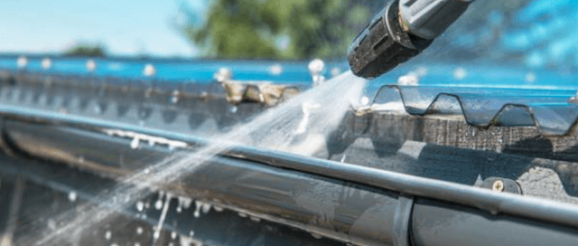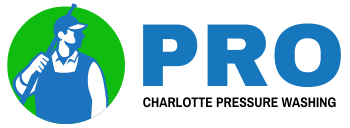Soft Washing vs. Pressure Washing

It is shocking how dirty the siding, wood or brick of your house can get during a year. Some of the most common stains include mud or dirt, algae, mold and mildew. These types of stains can give any house an unkempt, uncared for appearance, regardless of whether you invest time, money and maintenance into it.
Some of these materials, like dirt, don’t do much harm, but algae and mildew can be damaging to your health and your house. They produce allergens and bacteria that can affect your family, and some, like algae, can grow underneath vinyl or roofing material and enter into your house.
As a professional power washing service in Charlotte, we recommend you have your home’s exterior cleaned once a year. The spring season is typically the most common time of the year to do an intense home cleaning, but you can do it any time so long as the weather allows.
WHAT NEEDS PRESSURE WASHING?
All of the following surfaces need to be cleaned from time to time:
• Vinyl siding
• Rock and stone
• Brick
• Concrete and asphalt
Pressure washing used to be the only method to properly clean vinyl siding, brick and painted surfaces. Now in 2021, homeowners have a second option for exterior house cleaning: soft washing.
Like the names imply, one method is much gentler than the other one, but there’s a little more to it than that. Let’s look at the features of each method to help you determine which one is best for your house.
WHAT IS SOFT WASHING?
The soft wash method uses much less power than a typical pressure washer, hence the name. The highest water pressure in a soft washing system is 500 PSI. This lower spray is created from a nozzle with a wider spray setting, only slightly more powerful than a typical backyard hose.
Soft washing uses detergent, bleach and water in combination to remove organic matter from your home, roof and other outdoor surfaces. The solution used in a soft washing process can also include algaecides and residual inhibitors which will slow further growth of these types of organisms in the future.
Because chemicals, not water pressure, are responsible for cleaning the surfaces, no powerful water is necessary. This means that soft washing can be used for delicate surfaces that could otherwise be damaged by harsher pressure washing equipment.
The soft wash chemicals are sometimes cleaned off, but not every time. This just depends on what type of chemicals are used, if there’s plant or animal life that can be impacted by the runoff, and if the solution itself is strong enough to damage surfaces over time.
Soft washing provides the distinct advantage of getting down into small cracks and crevices to eliminate unseen bacteria, meaning that its effects can last much longer than standard power washing.
WHAT IS PRESSURE WASHING?
Pressure washing has long been the gold standard for cleaning exterior surfaces. It is extremely effective and fast, which is why most home and business owners still prefer it over soft washing.
This particular cleaning method uses water only, no chemicals, to clean off stains and organisms from exterior surfaces. The use of chemical-free water is a big plus to home owners that don’t want to use chemicals, either for the sake of the environment or to avoid zoning violations.
It can be used on a lot of different materials. Home owners often prefer power washing for cleaning their driveway, porches, decks, walkways and outdoor furniture because it is fast, efficient and cost-effective.
Pressure washing needs somewhere from 1300 to 3100 PSI water pressure with water sprayed out from a tiny nozzle for the most power. Both organic and inorganic stains are blasted from your home’s surface, preventing their growth and renewing the curb appeal of your house.
One drawback to power washing is that the water can sometimes be too powerful and lead to damaging the surfaces you want to clean. Pressure washing is strong enough to put grooves into wood and plastic, and it can get into cracks, breaking off pieces of brick or stone.
IS PRESSURE WASHING OR SOFT WASHING BETTER?
The obvious question for homeowners is, “Is pressure washing or soft washing better?”
Both soft washing and pressure washing methods are good for your home’s exterior, as well as sidewalks, driveways and more. Both of these cleaning systems can be performed by a professional – and truthfully, are more effectively done when left to the experts.
Soft washing is perfect for outdoor toys, yard tools, roof shingles, decks, gutters, patios and painted surfaces because it is less likely to damage wood and plastic. It’s also a safe choice for vinyl siding.
It kills organisms currently present on the surface, and it prevents future growth for much longer than power washing can.
A problem with soft washing is that it can kill plant life underneath the surface you’re cleaning. Remember to spray them down with water before applying the soft wash chemicals on your house or roof, and it won’t be an issue.
Pressure washing is the recommended choice for severe stains, and hard surfaces like asphalt, stone and brick. Pressure washing is the recommended choice for commercial properties. A professional pressure washing service in Charlotte may use a mix of detergents and water pressure to remove problematic stains, but they should let you know if they are going to be using chemicals after your estimate.
It can also be used on siding as well (and has been for several years) so long as it is done correctly. Powerful water pressure can damage weak or small pieces of the vinyl. A company that does power washing all the time are going to know how to protect fragile areas, but a DIYer can do a lot of damage.
Your home’s roof is off limits for power washing if there are slate, tile or asphalt shingles. The high pressure of the water will likely ruin these materials and cause you to replace your roof far earlier than expected.
Deciding between pressure washing or soft washing is best left for a pressure washing service. Which method is right for your house? Give PRO Charlotte Pressure Washing a call at 704-327-0417 and we will send an experienced technician over to take a look!
